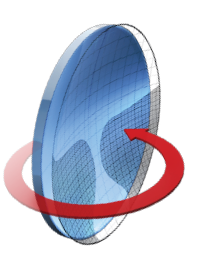Lens Design Technologies

Comfort
A great technological leap in free-form digital lenses.
Our Comfort Technology ensures stringent control over mean power, culminating in the creation of progressive lenses that deliver unparalleled levels of wearer satisfaction.
Superior image stability for more comfortable vision.
Our Comfort Technology meticulously manages the mean power (spherical equivalent) of progressive lenses, strategically minimizing unnecessary mean power in the periphery—particularly on both sides of the fitting cross

Ultra-Personalized
Pushing the limits of geometry in lens personalization
Ultra-Personalized Technology extends the boundaries of lens geometry personalization by integrating the wearer's accommodative capacity into the final lens calculation. This advanced approach serves to further minimize oblique aberrations, optimizing the overall performance of the lens.
Ultra-Personalized works in synergy with nature
It utilized the innate power of the human eye to refine the optimization process for personalized lenses.

Personalized
Optimal visual acuity across the entre lens surface
Our Personalized technology is founded on a sophisticated three-dimensional calculation model that meticulously incorporates the precise positioning of the lens and the inherent movements of the humans eye. The innovative calculation methodology yields a personalized lens, ensuring superior vision across all zones of the lens
Free-Form personalized progressive addition lens.
Each lens is tailored to align with the unique parameters of each individual wearer.

Flexible
Free-Form basic progressive addition
Lenses crafted with this technology feature a progressive surface on the posterior side, coupled with a simple curve, typically a sphere, on the front side. The progressive surface is calculated using a pure geometrical method, resulting in lenses that exhibit comparable optical performance to traditional progressive lenses, but with the advantages of digital processing, including flexible designs, variable corridor lengths, and insets.
Flexible progressive designs transfer the progressive design to the back surface of the lens to allow Free-Form processing